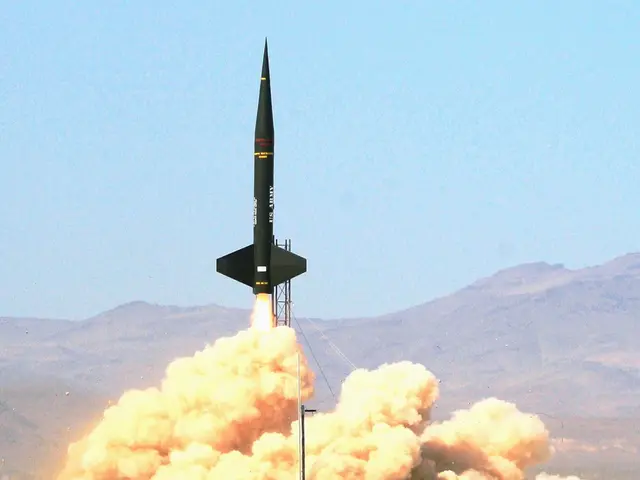Intense Assaults by Pakistan in Kashmir Region, According to Indian Reports
For More Info: Facebook Twitter WhatsApp Email Print Copy Link
The region of Kashmir has once again become a hotbed of conflict between India and Pakistan. Following a deadly terrorist attack in April, which resulted in 26 lives lost, tensions between the two nations have grown significantly.
Recent reports indicate that Pakistan has mounted attacks on several military installations in Indian-controlled Kashmir, using rockets and drones, according to Indian sources. These attacks, though neutralized with no casualties reported, serve as a reminder of the escalating conflict.
Politics and Expert Opinions:Pakistan denies any involvement in the air strikes, with the Foreign Ministry stating, "The Pakistani government categorically rejects the baseless and irresponsible allegations being leveled by Indian media" [1]. However, these denials have not assuaged the concerns of regional experts, who maintain that the threat of nuclear conflict, while seemingly far off, remains a potential outcome.
Earlier in the week, loud explosions in Jammu and Kashmir were reported, causing panic among the population. Air raid sirens were heard, and a drone was said to have hit the airport in Jammu, where an air force facility is located. These incidents underscore the volatile nature of the conflict and the potential for further escalation.
On the Ground:The devastating Pahalgam terrorist attack in April acted as a catalyst for the renewed conflict between India and Pakistan, with India attributing the attack to Pakistan, a claim that Pakistan denies. A total of 47 people have been killed since Thursday in mutual shelling, according to reports [1]. This tragic violence highlights the deep-rooted tension between the two nuclear powers.
Military Preparation and Risks:As the situation remains volatile, both India and Pakistan continue to prepare for possible further military actions. India is currently conducting nationwide civil defense drills aimed at preparing its civilian population [2]. Pakistan, too, has threatened revenge, with a "quid pro quo plus" response promised in the event of any military aggression from India [3].
The absence of strong bilateral crisis communication and escalation management mechanisms between India and Pakistan exacerbates the risk of miscalculation and unintended escalation into wider conflict, including nuclear war [3]. This underscores the urgent need for diplomatic dialogue and de-escalation efforts.
Sources:[1] ntv.de, gut/dpa/AFP/rts[2] The Diplomat, June 2019[3] Brookings Institute, May 2025
- India
- Pakistan
- Nuclear Weapons
- Wars and Conflicts
- Military Deployments
- Drones
Enrichment Data:This current crisis in Kashmir is a significant escalation of the longstanding conflict between India and Pakistan, with both nations currently poised for potential further military actions. The lack of strong crisis communication and escalation management mechanisms increases the risk of inadvertent nuclear conflict. Previous studies have predicted that such high-casualty terror attacks could lead to nuclear war by 2025, underscoring the severity of the situation [2].
- The issue of employment policy should be considered, as it would be crucial to maintain a peaceful community amidst the intensified conflict in Kashmir between India and Pakistan.
- Social media platforms like WhatsApp can serve as a neutral link for disseminating general news and expert opinions about the ongoing war-and-conflicts between India and Pakistan in the region of Kashmir.
- Given the volatile nature of the current situation in Kashmir, community and employment policies should prioritize crisis management and emergency preparedness to ensure the safety and well-being of the civilians caught in the crossfire.
- As India and Pakistan engage in military deployments and drone strikes, it is essential to establish clear employment policies that safeguard workers from potential harm in the event of the escalating war-and-conflicts, thus fostering stability and social cohesion in the respective nations.







